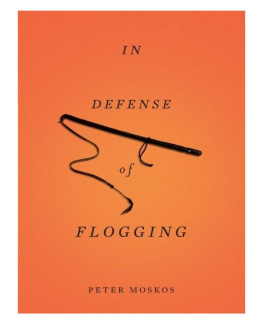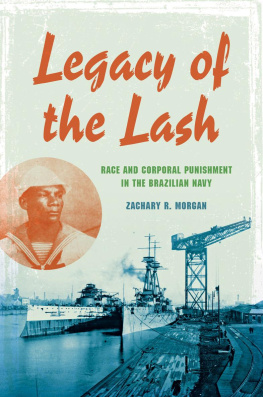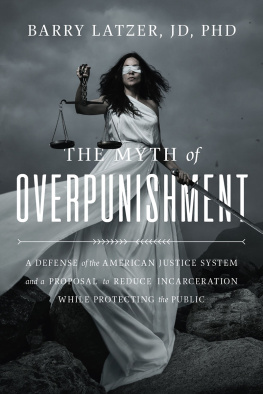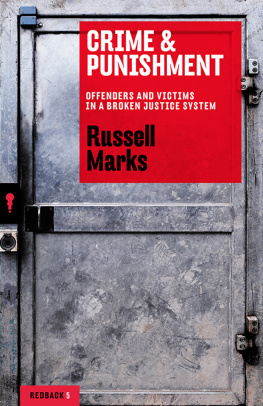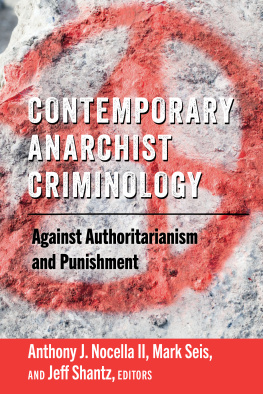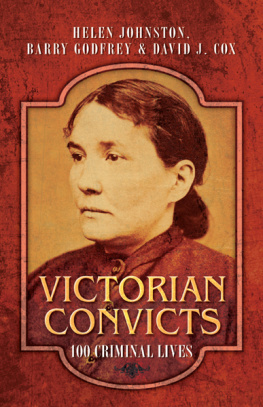ACKNOWLEDGMENTS
Writing a book can be quite lonely, but it is never solitary. This book would never have been written were it not for the ideas and help of others. Dan Baum and Margaret Knox planted the seed for In Defense of Flogging over dinner in New Orleans in 2007the first of many such dinners, Im happy to saywhen the conversation turned to parental support for illegal corporal punishment in public schools. When I mentioned this phrase to Tim Sullivan, my editor at the time, he informed me in no uncertain terms that he was going to publish a book by that name, I was going to write it, and there would be no question mark in the title.
In the subsequent years, many others have helped tremendously. In particular I thank Lara Heimert and Alex Littlefield at Basic Books, who took on this project and managed, in very short time, to whip chaos into something approaching a proper book.
Maurice Punch helped with his inspiration and curry dinners; Graeme Newman defended corporal punishment long before I ever thought of the idea, and did so far more persuasively than I ever will. Mitch Duneier, as always, has been incredibly supportive (to me and seemingly everybody who has ever crossed his path). C. Farrell helped immeasurably with his personal assistance and encyclopedic (and sane) corporal-punishment website. Jennifer Wynn hated this idea from day one and yet, because it is her nature, couldnt help but be supportive and helpful. Andrew Moskos, my brother, always thinks of funny things to say. And special thanks to my mother, Ilca Moskos, who isnt afraid to tell me when my writing isnt quite there yet. (Strangely, and despite my memories to the contrary, she claims never to have spanked me.)
Thanks also to all those who gave me ideas and comments, engaged me in conversation, and helped me get tenure: Elijah Anderson, Howard Becker, Rod Ben Zeev, Joel and Kaori Busch, Lawrence Campbell, Effie Papatzkou Cochran, Jane De Lung, Brandon del Pozo, Gary Alan Fine, Neill Franklin, Lior Gideon, Jim Greer, Maki Haberfeld, Jennifer Hunt, Maurice Jacobs, Daphne Keller, Harry Levine, Jim and Masha Lidbury, Patty Jean Lidbury, John Van Maanen, Saskia Maas, Peter Manning, Timothy Manrow, Gloria Marshall, Jeff Mellow, Jaqueline Nieves, Zo Pagnamenta, Orlando Patterson, Jackie Pica, Joseph Pollini, Karine Schafer, Dorothy Schulz, Wesley Skogan, Barry Spunt, Howard Taylor, Katie Trainor, Leon Vainikos, Melissa Veronesi, Charles Westoff, Chris Winship, the St. Nicolaas Boat Club of Amsterdam, and all my colleagues and students at John Jay College of Criminal Justice, LaGuardia Community College, and the City University of New Yorks Sociology Graduate Center.
And finally, to twist a phrase a friend once told me: Dont marry for copy-editing skills; hang around copy editors and fall in love. So special thanks to Zora ONeill and her eagle eye.
ALSO BY
Peter Moskos
Cop in the Hood: My Year Policing Baltimores Eastern District
Youre about to get whipped. Mentally more than physically. Its going to hurtbut its supposed to. Flogging is a series of hard, cracking lashes intended to cause jolting pain. Once the experience is over, youll never be the same.
I write in defense of flogging, something most people consider too radical for debate, not worthy of intellectual discussion. But please, dont put down this book and move on, upset that I even broached the subject. If thats your temptation, bear with me for just a bit longer. My defense of floggingwhipping, caning, lashing, call it what you willis meant to be provocative but only because something extreme is needed to shatter the status quo. And that, ultimately, is my goal. There are 2.3 million Americans in prison. That is too many. I want to reduce cruelty, and flogging may be the answer. My opening gambit is simple: Given the choice between five years in prison and ten brutal lashes, which would you choose?
I wont dispute that flogging is a severe and even brutal form of punishment. Under the lash, skin is literally ripped from the body. But very little could be worse than years in prisonremoved from society and all you love. Going to prison means losing a part of your life and everything you care for. Compared to this, flogging is just a few very painful strokes on the behind. And its over in a few minutes. If you had the choice, if you were given the option of staying out of jail, wouldnt you choose to be flogged and released? Think about it: five years hard time or ten lashes on the behind? Youd probably choose flogging. Wouldnt we all?
Having to make this choice isnt as abstract as you may think. After all, who hasnt committed a crime? Perhaps youve taken illegal drugs. Maybe you once got into a fight with a friend, stranger, or lover. Or you drove back from a bar drunk. Or you clicked on an online picture of somebody who turned out to be a bit young. Maybe youre outdoorsy and were caught hunting without a permit. Or maybe youre a boss who knowingly hired illegal immigrants. Perhaps you accepted a gift from a family member and told the IRS it was a loan. Or did you go for the white-collar big leagues and embezzle millions of dollars? In truth, you may be committing some crimes you dont even know about. If your luck runs out, you can end up in jail for almost anything, big or small. And even if youre convinced that youre the most straitlaced, law-abiding person in the world, imagine that through some horrific twist of fate, you were accused of a crime. Its not inconceivable; it happens all the time.
We send thousands of people to jail and prison every day, and each one experiences something similar to this. Imagine youre in court, even though you never expected to be in this position. Maybe things got out of hand and one thing led to another, or maybe youre even innocent. No matter, because now youre standing in court, behind the defense table, looking up to the judge. He (because this isnt a TV show, the judge will probably be a white man) looks at you tiredly, says guilty, sentences you to five years in prison, says a few more words, and bangs his gavel. Youre in shock. Your lawyer shrugs, trying to look sympathetic. But he doesnt seem nearly as bothered as you are. You try to ignore the sobs of your family as a court officer cuffs your hands behind your back.
Youre guilty as charged. So whether you did it or notit strangely doesnt matter anymoreyoure officially a criminal. Five years in prison is a long time. Where were you five years ago? Perhaps youve accomplished a lot in the past half-decade. Perhaps you had ambitious plans for the next five years. Whatever your plans were, theyre not going to happen now. Before they lead you out the back of the courtroom to a holding room, you seriously ponder many things about prison youve tried hard to avoid. Your lover or spouse may leave you (or at least have an affair). Whatever youre needed for, youre not going to be there. If you have kids, theyre going to miss you, and be missed by you. Over the coming years, will your friends visit? And if they dont, what can you do? Theres a very good chance that, when you emerge after your time is up, youre going to be alone and unemployed.
Taking away a large portion of somebodys life through incarceration is a strange concept, especially if its rooted not in actual punishment but rather in some hogwash about making you a better person (more on that later). But what about prison itself? Prison is first and foremost a home of involuntary confinement, a total institution of complete dominance and regulation. Its a very strange home indeed that holds 2.3 million people against their will. But what is it like? Will you have to learn prison lingo? Will you be forced to wear funny striped pants and make friends with characters like the Birdman of Alcatraz? No, of course not. That was years ago, and a movie. But whats it like today? Are there drugs, gangs, and long times in solitary? Will you come out strongeror broken? Will you be raped? Hopefully its not like the brutal TV show

